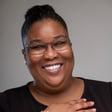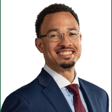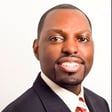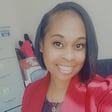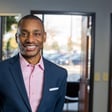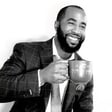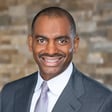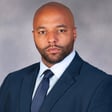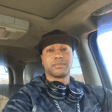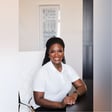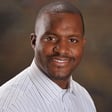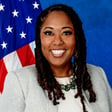Public Health and Life's Progression
00:00:12
Speaker
So I think with public health is you could actually paint a picture of the progression of life. So you could paint starting with a woman who is pregnant to the next phase of life where now you have this child
00:00:29
Speaker
who then grows up. And so just kind of looking at the progression of life in the background, you can have a scene of what that family's environment looks like. And so mom could have first started out in a not so good environment, but then as she is progressing to life,
00:00:53
Speaker
As the child is progressing through life, how did that negative environment impact her life as well as that child?
Podcast Introduction with BA
00:01:04
Speaker
If you've ever wondered, what does my friend, partner, cousin, actually do at work? Then you'll love Take Your Homeboy to Work Day podcast. I am your host, BA, and here's what you can expect by tuning in. Each episode, I'll invite a guest to share their career journey, from a youth in school to their rise as a professional.
00:01:28
Speaker
We'll learn the nuts and bolts of jobs, and you'll learn how what they do shows up in our everyday lives. Finally, I'll have them open up about how they find fulfillment through their work. So for anyone interested in hearing the firsthand experience of a specific career, these conversations are your launching path.
Public Health vs. Clinical Roles
00:01:48
Speaker
Today, we'll learn about public health, which is the science of protecting and improving the health of people and their communities.
00:01:58
Speaker
Now this work is achieved by promoting healthy lifestyles, mitigating injuries, and reducing and preventing diseases. Public health professionals try to prevent problems from happening by implementing educational programs, recommending policies, and conducting research.
00:02:18
Speaker
Now this is in contrast to clinical professionals like doctors and nurses who focus primarily on treating individuals after they become sick or injured. Public health also works to limit health disparities and focuses on promoting health care equity, quality, and accessibility.
Meet Dr. Jaquetta Cobbs
00:02:40
Speaker
Today's guest is Dr. Jaquetta Cobbs, the Academic Program Director for the Department of Public Health Sciences at the Medical University of South Carolina. She is a committed educator who uses her love for teaching and leading to encourage others to use their gifts for society's benefit.
00:03:01
Speaker
Her passion for healthcare has given her a chance to focus on diabetes prevention in the black community and help the US Army reduce injuries during basic training. I'm delighted to have you on and share your journey with the audience today, Jacetta. Welcome to the show.
Foundational Public Health Principles
00:03:18
Speaker
Thank you so much, Brandon, for that wonderful introduction about public health. So thank you so much for having me today.
00:03:26
Speaker
You're welcome. You're welcome. So I gave a quick introduction about what I think public health is, but in your own terms, could you actually share what is public health? And I guess you could go ahead and explain why did you decide to go into it? Great. Thank you. So actually what you have already mentioned is a really great definition of what public health is, the main focus
00:03:55
Speaker
public health is that prevention piece, as you have already noted, and how in contrast with our clinicians, our MDs, our nurses, they are there to treat things. So that is that element of public health. But what I like to explain to people in layman's terms is that public health is really the foundation of everything.
00:04:16
Speaker
So you can't really get to that treatment piece until you have actually laid down the foundation of the interventions because treatment may actually be the intervention in preventing something. So for instance, we all have speed limits on our highways. That is public health. Brandon, if you remember when we were kids, you went to the restaurant and the host is always asked, you know, do you want to sit in a smoking or non-smoking section, right? So air quality, when you think about air quality,
00:04:46
Speaker
and water quality, that also falls under the umbrella of public health. We put that under the umbrella of environmental sciences.
00:04:53
Speaker
When you think about the restaurants that you're eating at, our meats that we are purchasing from the grocery store, all of those things are inspected by the FDA. So again, public health. So everything that you touch in your day-to-day life has a public health stamp on it, whether you think about it or not, even when it comes down to health policy, that is also public health as well.
00:05:20
Speaker
when you think about health policy and you brought up the issue of health equity and health disparity. So all of that falls under the umbrella of public health. And so there are, while you do have clinicians who treat, there are clinicians who also have a background in public health as well.
00:05:37
Speaker
Gotcha. Wow. Well, this seems like a very wide reaching topic. I'm excited to jump in. I'm excited to jump in and learn more. I'd love to learn a little bit more about you first.
Dr. Cobbs' Career Journey
00:05:50
Speaker
So what drew you to go into public health? Was there a specific experience in your life or does somebody guide you to this? How did you go down this path of public health?
00:06:03
Speaker
Great question. So initially, when I went to college, I actually went to college with the intent of going to medical school. But around my junior year of undergrad was when I actually had a revelation. And after doing a lot of the MCAT prep, doing a lot of shadowing, in that process is where I actually discovered that that really was not what I wanted to do. But I knew working in health care
00:06:33
Speaker
is what I wanted to do, but not necessarily treat patients. So I had a conversation with my academic advisor at the time, which was Dr. Boyer, and just talking to him about what I was interested in. And I just couldn't really articulate into words what it was that I was looking for. And so he was the one who actually introduced public health to me.
00:06:57
Speaker
And so he had the conversation with me about public health and then proceeded to let me know that we actually had an MPH program at Florida A&M. And so I applied to the program, I got accepted, and in the intro to public health course was when the light bulb came off.
00:07:15
Speaker
And that was when I learned in all its facets what public health actually encompasses. And that was the defining moment for me that this is actually what I wanted to do. Now within public health, now my concentration is actually epidemiology. And so I selected that concentration during my MPH program because I was interested in answering the who, what, when, where, how questions.
00:07:42
Speaker
You know, how did someone get sick? Where did they, you know, get exposed? How many people did they expose to this? If you think about COVID, you know, when it first came on the scene, that was an epidemiologist's job was to figure out the transmission of this disease. And so that is what I was interested in as I was going through my MPH program. And so that was the route that I took.
00:08:11
Speaker
And I have done a number of things since
00:08:15
Speaker
obtaining my MPH. As you mentioned, I work for the U.S. Army Public Health Command. I've also worked for state health departments as a diabetes health educator and facilitating diabetes prevention programs in the community. I have done a lot of clinical research jobs as well. I've done a lot of program management for clinical research from large pharma companies to small PI investigator initiated studies.
00:08:44
Speaker
I've done a lot in the last 14, 15 years now since being introduced to public health. And as you mentioned earlier, it's such a vast field that you can pretty much do anything within the field and still be under the realm of public health.
00:09:03
Speaker
Yeah. Well, you know what? I love how you explained why you chose epidemiology within public health. You had mentioned you wanted to answer the questions of who, what, where, when, why as it relates to sicknesses or injuries. I think that's a great explanation for that. What are the other fields within public health?
00:09:27
Speaker
So you have biostatistics. And so, I mean, it may speak for itself. So those are your biostatisticians. Those are the people who are actually running the data. And so you may see that person either working at an academic science institution. They may work for a state health department to run the data because you need the data, right? And so then you have health educators. So that's how, or you may, they may be also called community health workers.
00:09:57
Speaker
or community health educators. So you have health education. And so that is where you have your talks of the implementation of educational programs or bringing awareness to certain things. But again, you need the data to help drive that.
00:10:17
Speaker
so that you know what type of programs you are implementing. Health educators also do like key informant interviews with individuals just to kind of get our focus groups just to get information about something so that they can know what intervention that they need to develop or how they need to implement something within a community, especially when you're talking about implementing something that is specific to say an African-American community, you want to have
00:10:45
Speaker
make sure that whatever program you are developing is tailored specific for that community. And then you have environmental health. I mentioned that earlier about air and water. So how does the environment that you live in, how does that overall impact your health? We have seen these cases in Flint, Jackson, Mississippi. We've seen these cases in different areas of having contaminated water. So that falls on the umbrella of environmental health. And then we have health policy.
00:11:16
Speaker
Um, and so you talking about health equity, you're talking about, um, insurance, lack or no access to, um, to health, to healthcare. So that is, you know, health policy, but again, everything works together for the common good. So we each, so you can have an individual who represents each one of those backgrounds that I just mentioned on one team.
00:11:45
Speaker
who is, you know, working for one particular project, if that makes sense.
00:11:51
Speaker
Yes. Gotcha. Awesome. Well, first, thank you for that brief overview of all of the different fields. I appreciate it. The audience appreciates it.
Networking and Community Impact
00:12:00
Speaker
And I guess, let's see. I would love, I know you're into education now and running a program, but I'd love to start off with a couple of questions about some of your early jobs as a researcher or working in the lab or leading studies.
00:12:16
Speaker
So I mentioned that you've done work with diabetes prevention and you also did work with the U.S. Army. You can choose either one of those or even some another example that I may not have brought up. But I guess and I guess let me first layer, you know, when you talk about mental health and we talk about prevention, I guess it's always hard to measure because it's a nuanced conversation. You know, because you're trying to say that
00:12:46
Speaker
things could have been worse if we did not focus on prevention, or things could have been better if we had focused on prevention, which can be hard for people to visualize because you are stopping something from happening. Yeah, so as you know, I guess, so with my next question, in either of those two examples,
00:13:09
Speaker
How did you show your success? So if we were going to talk about the US Army example and you are trying to, you're focused on reducing injuries during basic training, which ultimately is best for everybody. How did you show that success? How did you know that what you were working on was the correct thing versus just leaving the topic alone altogether?
00:13:34
Speaker
I don't know. Could you explain how you first go into these studies, please? I did. That one actually was an intervention. The lead team, the issue was that when a soldier gets injured during basic training, when they go to the clinic, it could take
00:13:57
Speaker
days, it could take sometimes weeks for them to actually be seen for whatever the injury was. And it could be something as minor as a sprained ankle. But if you have a soldier who has a sprained ankle and they're waiting in the clinic, say a week to be seen for a sprained ankle, that have now put them out of the cycle of their training. So it now adds time to their training. So that now adds money.
00:14:23
Speaker
So, you know, there are different ramifications to that, right? So now we got a cost issue that is currently happening. Now we have a soldier who cannot finish the training in the allotted time that they were supposed to so that they could then move on to the next phase of their training, whether it was for MP, engineering, what have you. And so what the intervention was, we were actually looking to see if we were to provide each unit during basic training
00:14:52
Speaker
a medical advisory team, we called it the MAP team. And so with that team, it consisted of a physical therapist, a personal trainer on site with them so that when an injury occurred, they already had a team on staff that could take a look at that and correct that issue right then in real time, as opposed to sending the person to the clinic and them having to wait.
00:15:20
Speaker
So we did the intervention where some people got a team of five, some got a team of two, and then some didn't get a team at all, just to kind of see whether having that team on hand would actually be beneficial. And of course, you know, we saw at the end that it was indeed beneficial and it saved a lot of time. It saved a lot of resources. That way the clinic was actually seeing those who had the more severe
00:15:49
Speaker
injuries as opposed to someone with a sprained ankle or tweaked knee. And so that was a really cool project to work on. And same thing with the diabetes prevention program that I worked on. The CDC at this point in time had developed this intervention. It was called Power to Prevent. And it really was a toolkit
00:16:14
Speaker
to be implemented within African-American communities to help prevent diabetes. Well, what I had was I actually partnered with a prostate cancer survivor group in Greenville, South Carolina.
00:16:29
Speaker
Um, and so we ended up having two groups of individuals because it was so many men in the group who was actually interested in it. Um, because not only did these poor, these men survivors of prostate cancer, but they also had type two diabetes. And so I thought, Oh, well, why the vast majority of them are married. They are older black men in the South, which means they most likely are not preparing their meals, their spouses.
00:16:55
Speaker
So why don't I incorporate their spouse in the program? So I actually did two groups of individuals. I did one with the men only, and then I had a group with the men with their spouses. And we went through this toolkit. I gave them all the different resources. We met for 12 consecutive weekends. So I drove up to Greenville, and we partnered with the YMCA so that they actually had access to a gym
00:17:25
Speaker
for free. And we work with them and we talked about diet, we talked about meal prepping, we talked about exercise, we talked about knowing your numbers, because that's important. A lot of people go to the doctor and they're not sure what the doctor is actually saying to them, what is that A1C? What does that number actually mean? What does that number mean for you? What is normal for you? And so we talked about all of those things. And at the end of those 12 weeks, the
00:17:54
Speaker
All of those who had high A1Cs at the beginning of the program had a report from their doctor that their levels were either normal or close to normal. And then there were a few who were pre-diabetic at the start of the program who were no longer pre-diabetic at the end. And then we also had some spouses who actually lost weight during the program because if they were preparing the meals different,
00:18:23
Speaker
for their spouse, that means they were also consuming something different. And as a support working out with your husband, now that now has a benefit on me because now as a wife, I'm now losing weight. I'm now seeing a change in my cholesterol, my diabetes. And so that was a huge success as well. And still to this day, that program is actually still being ran in Greenville. At the end of the program, I was actually able
00:18:51
Speaker
to train a few community leaders on how to actually sustain the program. And it has been, that was 2010. So that's been 12 years. Wow, impressive. That that program has still been being able to sustain. They have been able to find funding from various sources to keep it going.
00:19:15
Speaker
Yeah, I guess, impressive. How many people do you think that you've impacted? I guess, and we conclude the spouses in there also. How many people do you think have been able to benefit from this knowledge and improve their diets and live longer, healthier lives? It's been a lot because the initial program was done with like 20 people, 20, 25 people.
00:19:39
Speaker
Um, and so it has, you know, if you take that over the course of 12 years, that has now impacted thousands of people, um, over the course of its lifespan at this point, uh, because that information that they learned, they were able to trickle that down to their relatives, right? So they were able to share that with their children, with their church members. Um, and so with their, that impact, there have been thousands. The same with the, um, the army project.
00:20:09
Speaker
that have impacted thousands because we were there for almost two years during that project and each unit had like over a hundred soldiers in it so I think by the end of that project it was probably well over 50,000 soldiers that we had impacted with just doing those uh you know providing personal trainers and um
00:20:38
Speaker
athletic, the physical therapist, sorry, the physical therapist on site. And so that was upwards of almost 100,000 people that we covered in such a short period of time. And so I know that is still continued. They were actually able to implement that and make that actually a thing for basic training at Fort Landaway.
00:21:04
Speaker
Wow. Well, congratulations on having an impact. Thank you. That's extremely impressive. I guess this was some of the first work you did after you earned your master's, correct?
Public Health Career Insights
00:21:20
Speaker
It is. And how did you learn about these opportunities to apply for them to participate?
00:21:27
Speaker
You know, that's a really good question. So actually the job that I got as a health educator for the state health department, that actually was my first job after I graduated. And I got that one because as part of my MPH curriculum, I had to do an internship. And so during my internship, I actually made some connections with some folks at the state health department. And so that's actually where I got the connection for that job.
00:21:58
Speaker
was just from the networking that I actually did during my internship, which is why I always encourage students to always network and never burn a bridge because you really don't know how an opportunity, what door that opportunity may be for you. So that's how I actually got introduced to that was just from the connection that I made during my internship.
00:22:23
Speaker
And that job they actually created for me. I went up for a meeting and they said, hey, you know, we just got this grant. We got this program, not really sure. And so I pitched something and the job was mine. And then the job with the Army for that one, one of my classmates from my MPH program was also working with the US Army Public Health Command, but she was on the project, but she was actually
00:22:52
Speaker
at Maine headquarters in Maryland, but they actually needed some people on site at Fort Leonard Wood. And so she talked to the project lead about myself and another one of our classmates that we were looking for a position and I met with him and he was like, I think you should come out here. And so that's how I got that second job. So those two came from,
00:23:21
Speaker
connections that I had either from a classmate or from networking during my internship. Gotcha, gotcha, gotcha. And thank you for stressing the importance of networking, maintaining positive bonds, not burning bridges. Thank you for that extra message in there also.
00:23:39
Speaker
Yes. Now these being some of your first jobs at the Earned Masters, one of the questions I love the audience to hear is how much you can make after you first earn your degree and go out into the working world. So you don't have to share your specific experience. You can share a range, but for your early jobs, what was that range that somebody could expect to make? So
00:24:06
Speaker
Early on, I actually was not making that much money at all. So let's see. This is circa 2009 when I actually graduated with my MPH. And so that first job, I think that range was somewhere between 30 and 35. OK. Was somewhere near where my salary landed for that first job, which, OK, it was fine at that time.
00:24:35
Speaker
got a lot of experience out of that. I also knew going into that job, too, that it was not a permanent position. So that was another thing with it as well. I knew that was not a permanent position. That was, you know, something short term for me to gain some experience build up my resume. My next job, that one was in the 50 somewhere 5055 for that second one. But
00:25:03
Speaker
This is a constant conversation that I always have with students, you know, when they graduate is like, well, what kind of salary should I be looking for? We know salary is relative to where you are with sector because in public health, you can work on a state level, you work for nonprofit, you can work on a federal level. And we know that the salary differs just across those three sectors. And then once you add in location, you know, the north, you may get paid a little bit more to match the cost of living there.
00:25:34
Speaker
versus in the South. So you have to put in consideration a lot of different factors. But what I always advise students to do is do their own personal budget. What do you need as an individual to actually live comfortably? Not paycheck to paycheck, but what do you really need to live comfortably? Use that as a starting point and then look for positions within that range because what
00:26:04
Speaker
was comfortable for me may not necessarily be comfortable for you. We all have different responsibilities. So what a single person with no children with that person's needs are is going to be very much so different than a person who has children who may have a family that they are taking care of. So taking consideration all of your financial needs.
00:26:32
Speaker
and use that as your basis in figuring out what kind of salary you want to go after. And then, you know, of course you got to tie in your years of experience and education and all of that. But because the field is so broad, we really don't have a ladder per se in the field of public health when it comes to jobs. So it makes the conversation
00:27:01
Speaker
have so many different layers to it because it's going to be different because of the broadness of the field. Gotcha. Gotcha. Well, thank you for sharing that transparency about your own personal journey with the early jobs financially. I really appreciate it. So thank you so much for that honesty.
Transition to Academia
00:27:19
Speaker
Now, I know you have now transitioned into education. How did you make that transition from, or I guess not how, but I guess, yeah, I guess how and why. You know, now you are working with the youth or maybe younger people who are trying to figure out if they want to get their master's in public health or if, you know, maybe they
00:27:41
Speaker
are deciding from public health and medical school. How did you make that transition? And why did you make that transition now into, I guess, education and working on that side of public health? Great. So the reason why, so my why is that when I went back to school to get my PhD, I knew at that moment that the end goal for me was academia.
00:28:08
Speaker
So I've done all of this work in research. So that's one of the reasons that I selected doing a PhD over another form of doctorate, because I had so many years of experience with research. But then I also knew that academia was the end goal for me. So as I was going through my PhD program at that time, I was in my current department that I'm in right now. But I was actually the program manager of a large
00:28:38
Speaker
NIH grant. And at that time, the grant was coming to an end and our Masters of Public Health program, the program manager role became available. And so at that time, I had a conversation with our department chair at that time to talk about what my next steps were going to be. I was getting ready to finish up my PhD. And so it was really time for a change.
00:29:03
Speaker
And so I was telling him what my ultimate career goals were. He was like, OK, well, now knowing that we have this opportunity, I think this will now be a great time for you to really get some experience on the academic side of things because you have so many years of research experience. You already know the ins and outs of that. There's now time to kind of get this administrative academic side, start teaching, start building up on that aspect.
00:29:32
Speaker
And so I came into this role, got a lot of experience with curriculum development, policy development, made a lot of drastic changes to the MPH program, led the accreditation piece because the program was not accredited. So I led that piece and we are now fully accredited.
00:29:55
Speaker
program. And also because of my work with that, I'm now a site visitor for the accredited body to review other MPH programs across the country for their accreditation. And so that gave me a lot of insight
00:30:14
Speaker
on the academic side. So when you're a student, there are certain things that happen that you're kind of like, I just wish this professor would do this, or I wish this program would do this, or this institution would do this. But learning a lot, there's a whole lot behind the scenes that happen that students aren't aware of. And so that has been very much so intriguing for me. And why I'm here is I'm really pushing and wanting to see more faces that look like mine.
00:30:43
Speaker
one in academia, but also two in public health. Because when we look at things like health disparities or systemic racism, when we look at these different issues that we currently are facing in health care, we need more people who represent us at the table to address these these causes. And so that is what my
00:31:11
Speaker
main mission is, and so we're talking with high schoolers about, you know, what do they want to major in for high school? There's a lot of students who really don't know that they are undergraduate public health programs. There weren't any when we were all going off to college, but now there's a lot of undergraduate public health programs because a lot of us got into public health from some other type of major. I was a chemistry major,
00:31:37
Speaker
in undergrad, there was no possible way for me to know about public health as a chemistry major if my advisor had not mentioned it to me. But now there are undergraduate programs. And so I now am having these conversations with as early as high schoolers, you know, about what public health is because of what I'm seeing on the graduate level from applicants is that students really don't know what public health is until
00:32:03
Speaker
maybe their senior year, they take an intro to public health course as an elective during their undergrad, and it peaks in interest, and now it's like, hmm, what is this thing? I want to explore this a little bit more. And then they are applying for master's of public health programs to learn more about public health. But if we can start that early, why not? Yeah, all the better for the student and for society.
Consulting and Mentorship
00:32:32
Speaker
And so that's kind of one of the things that I'm doing as a consultant is talking with high schoolers and mentoring them about, you know, public health, what it is, how they can actually tie public health into a clinical background. You know, it's not saying that you should only be, you know, in public health, but if you have an interest in being an MD, why not have a public health background as an MD makes you a more well rounded,
00:32:58
Speaker
Now you're looking at your patient as a whole. How does this person's built environment impact their overall health? You can prescribe medication all day, but if the person does not have the funds to purchase the medication, you're back at square one.
00:33:16
Speaker
Yeah, question for you. I used to work in I used to work in healthcare and work with doctors, and some of them would put the initials do after their name. And I believe that represents they have more of a holistic look at health versus
00:33:32
Speaker
Yeah. Well, could you share what does that DO stand for? And I guess, am I thinking at it correctly that this is a combination of MPA of public health and of clinical, um, traditionally how we look at clinically where we try to treat them after they're sick? Yeah. So DO and it's doctor of osteopathy. Okay. Is what the O stands for. And so they pretty much treat patients just as if you're a MD, but they look at
00:34:02
Speaker
a patient from a holistic standpoint. So what else can I do for this patient besides prescribing them a medication? Not saying that they don't prescribe medications, but just looking at other factors as well. And you're starting to see that a lot more now. I think a lot more programs are being developed. There are a lot of people who are now starting to
00:34:32
Speaker
explore the DO option over MD. So we're starting to see it a little bit more now. It's a little bit more common I would say today than it was say a decade ago.
00:34:46
Speaker
Gotcha. Thank you. Earlier you actually did a perfect segue where you actually mentioned your consulting company, where you're trying to bring more faces, faces that look like us, of course more women into the field.
00:35:05
Speaker
How can someone, where can somebody learn more about your consulting company? And then who have been some of your current customers? If I'm considering bringing you in to talk, who would you like to speak to right now to say, hey, bring me in so that I can bring awareness to this education field? Great question, Brandon.
00:35:28
Speaker
You can find me, I'm on Instagram and LinkedIn. So on Instagram, I'm J. Renee, consultant. On Instagram, Jeketta Cobbs. But when I initially started my consultant firm back in 2020, the intent actually was not to focus on high schoolers, the intent actually was project management. Because what I, you know, going through COVID, you know, we were all on a lockdown, and we know that our state health departments were slammed.
00:35:59
Speaker
during that time. And so I had a couple of colleagues, you know, who were behind on some projects. And so I was able to, you know, provide some services for them at the state health department. And so that is where the consultant actually was brought to life was out of that, you know, helping with doing different projects and stuff. But as over the last year, I would say six months to a year now,
00:36:28
Speaker
I have been wanting to switch gears from doing more of the project management to really doing more mentorship and really advising high schoolers about college, how to be more successful in college because sitting in on admissions committees on a graduate, on the graduate level, I see certain things, right?
00:36:56
Speaker
And so some things can really be prevented. And so if we talk to high schoolers about how to be successful in college, you have a lot of students who are first time college students. That's a lot to navigate when you are first time college students because one, you don't have
00:37:14
Speaker
anyone in your immediate family to really have as a resource to ask questions about, right? You're trying to really navigate this whole system by yourself. You know, whether it's from a financial standpoint, but then also how do you navigate going to classes? Because that's completely different than going to high school. You're now on your own. You're now responsible for getting up, making sure that you go to class on time. Your study habits are going to be very much so different. That was a humbling
00:37:42
Speaker
moment for me when I went off to college because in high school I didn't really need to study that much. I didn't really need to spend a whole lot of time studying, especially when it came to math and science. I really didn't have to focus on something that long to really get it so I could really look at something the night before, ace the test the next morning. I went into college thinking that was going to work and
00:38:06
Speaker
to my surprise that was that did not that did not work and so just having these kind of candid conversations with high schoolers you know to better prepare them for college so that they are more successful so that when they are submitting applications for graduate school or medical school that they have a higher gpa because that first year is usually kind of like the trial and error
00:38:31
Speaker
But you don't want to have a GPA to suffer because of something that could have been prevented, right? And so that's what I am developing now is more of like a curriculum to kind of help high schoolers with navigating that next phase and then also tying in what public health is and what they can do now as a high schooler. You know, how can they advocate for something?
00:39:01
Speaker
as a high schooler. And so that's where my focus is right now. Gotcha. Awesome. We'll salute to you for that work. And in the notes, I'll be sure to include links to both those sites where they can find you. So I want you to think abstract for this next question. And you've done a lot. So
00:39:24
Speaker
Who knows where this can go, but I love to ask if you were working with a painter and they wanted to commemorate the work you've done into a picture, a visual representation, how would you describe that picture to the painter?
Public Health: Life Stages and Environment
00:39:42
Speaker
Wow. Okay. A picture to a painter of the work that I have done so far. Yep.
00:39:52
Speaker
um or how you think about or how you just how you think about public health in general whichever one feels natural for you to answer okay let's do public health um so i think with uh public health is you could actually paint a picture of the progression of life so you could paint
00:40:12
Speaker
starting with a woman who is pregnant to the next phase of life where now you have this child who then grows up. And so just kind of looking at the progression of life in the background, you could have a scene of what that family's environment looks like. And so mom could
00:40:36
Speaker
have first started out in a not so good environment, but then as she is progressing through life, as the child is progressing through life, how did that negative environment impact her life as well as that child's life? Because when you start thinking about the phases of life and the stages of aging, things change.
00:41:05
Speaker
across the course of a lifespan. So I think I would tell the painter to start there.
00:41:14
Speaker
Gotcha. Thank you. I know that was tough. I know thinking abstract sometimes about the work is always tough. It was. And as I'm sitting here, I'm actually doing an airbrush and I'm actually visually trying to do an airbrush, trying to figure out a painting. No worries. Your answer is perfect. There is no right or wrong answer. That's the beauty of art. That's the best interpretive. But thank you. It really is.
Handling Misinformation in Public Health
00:41:40
Speaker
So we've talked a lot about the good of public health and your career and what you've been able to accomplish and what's motivated you. But as with anything, there's also a little bit of bad and maybe some ugly or some watch outs. So as you are telling somebody who's graduating with their MPH about to go into their first job, what's one watch out that you would give for that young person just so they don't fall off the track of success?
00:42:11
Speaker
That's a really good one. I would actually say that just in these last few years going through the COVID pandemic, we've seen how this turned into a political issue. And with that, it caused a lot of strain on a lot of public health practitioners. We had a lot of people who quit during the pandemic. And even so now we're talking about
00:42:39
Speaker
issues that is public health related. It has taken such a political turn that I would say that that is actually the biggest watch out. Even when you talk about women's rights, the political spend that we are currently living in right now as it relates to women's rights. And so if you have a passion for women's health,
00:43:04
Speaker
or infectious disease, these are some of the things that you may actually encounter in your day-to-day work. And we are also in an era of social media, right?
00:43:21
Speaker
Any and everybody is developing. Right. Everyone is an expert. Everyone is developing different groups, you know, to put their spin on things. There's a lot of misinformation out there. And so it's actually making our work a little bit harder now because we are having to combat misinformation that is out there. You know, if a state health department has a Facebook group, sometimes you see in the comment section,
00:43:50
Speaker
you know, really bad comments. So how do you as a professional, you know, respond to those types of things? So I would say that is the biggest watch out right now is just trying to figure out how to effectively communicate in a social media era and then also the political nature of things right now.
00:44:15
Speaker
Yeah, yeah. Those two do seem very difficult for a public health person to have to deal with. How have you dealt with those things? I mean, I guess, what would you do if somebody wrote something that was incorrect or false and they added a little bit of sass and attitude with it in their comment too, or some emojis? How do you prepare yourself to respond to people online?
00:44:44
Speaker
You know, so I, during the lockdown, I actually had to protect my piece. I actually kind of refrain from certain pages. Yeah. Because, you know, if you keep watching something enough, you won't start getting infuriated. And, you know, if I feel compelled to respond to something, because you can tell whether something is a bot or if it's a real person that's
00:45:14
Speaker
you know, putting out some misinformation. You know, I may comment with correct information with links to where they can get more information. But if they keep coming back with nastiness, I just stop there because at the same token, this is still social media. We all are searchable. And so.
00:45:38
Speaker
I just try to monitor what sites I'm actually affiliating myself with. And I always advise my students of that as well to be cautious and mindful of how you actually interact with people online. Because we've seen that a lot of people have lost jobs because of how they have been interacting with people online. Yeah. Yeah. Well, that's why.
Gratitude for Contributions
00:46:04
Speaker
Go ahead. Go ahead. Oh, no. Was there anything else you wanted to share?
00:46:09
Speaker
No, go ahead. OK, cool. Well, I think that advice is wise. I was just going to add, I don't know if they can offer you all training on how to properly respond in instances like that, but I think that would be time well spent to handle so that you can actually still be a beacon of reason and correctness amongst all of that. So I was just going to throw that out there.
00:46:35
Speaker
But thank you for sharing your own, I think disengaging is probably the wisest to protect yourself because most people are just trolling.
00:46:44
Speaker
Well, this has been a fun conversation that, even when we had our intro call, has been illuminating. And then when I did my own research, my eyes just kept being opened wider and wider. So thank you once again for coming on. Before we go, I have a little question that allows my guests to learn a little bit about you. And it's a little bit of a curve ball. I didn't put this in the questions that I sent over.
00:47:12
Speaker
But it's all fun. There's no right or wrong answer. And, you know, I imagine the answer probably could change tomorrow. It all just depends upon how you're feeling today. So here's the question. Okay, let's see. So imagine you are an A&R for a music company.
00:47:31
Speaker
and you are now given an unlimited budget. So you can bring on any three musical artists, any genre, and then one producer or beat maker to make the song for these three artists. Who would you choose? Oh, wow. Okay. Let's see. Chris Brown. Okay. I would also bring in
00:48:02
Speaker
Is it, do I need to bring in solo or can I bring in a group? Oh, good, good question. Good question. Good question. You can say a group, you can say a group. So a group can still be counted as one entity, even if let's say there's three people in the group. So groups count also, and that'll just be one entity. All right. So I'm going to bring in new addition. Okay. I'm going to bring in new addition and I'm going to bring in Chris Brown.
00:48:30
Speaker
And let's see, so I need a beat maker, right? We still need a third person also. Oh, I need a third one. Okay. Third artist, a third artist. Let's give me a female artist that I really need. You know, I'm gonna do a new artist. I'm gonna bring you a sweetie. Okay. All right. Okay. Okay. I'm gonna bring her in and then
00:48:58
Speaker
Beatmaker, who do I want? You know, I like Jermaine Dupri as a producer. Yeah, yeah, yeah, yeah, yeah. I can dig it. I love that. You've literally brought in maybe like three generations of music, three eras of music, all with a lot of personality and uniqueness and pizzazz to them. You put in JD's hi-hat, his use of hi-hats on a beat. That's going to be a really good song. I like what you did there.
00:49:28
Speaker
Yeah. Yeah. Awesome. Because my taste in music, it does switch by the day. It does. So that's how I'm feeling today. Thanks. I love it. I love it. Well, thank you so much for coming on, sharing your journey. I appreciate you taking time out of your schedule to share with others. I feel 100% confident that somebody's going to learn from this and join MPH.
00:49:54
Speaker
join public health and earn their MPH as a result of this. So thank you so much. Before we go, is there anything you'd like to leave us with? And I guess could you share where they could find you online again? You can find me on Instagram at JReneeConsulting. You can find me on LinkedIn at jacadacobs. And the last thing that I will actually leave your listeners with is just
00:50:22
Speaker
be inspired by public health. Awesome. Thank you so much again, Jacetta. I appreciate it. Thank you so much, Brandon. Hey, before you go, we need your help to spread our message. So please subscribe, like, and rate five stars wherever you get your podcast and on LinkedIn at Take Your Homeboy to Work Day podcast. Thank you.

